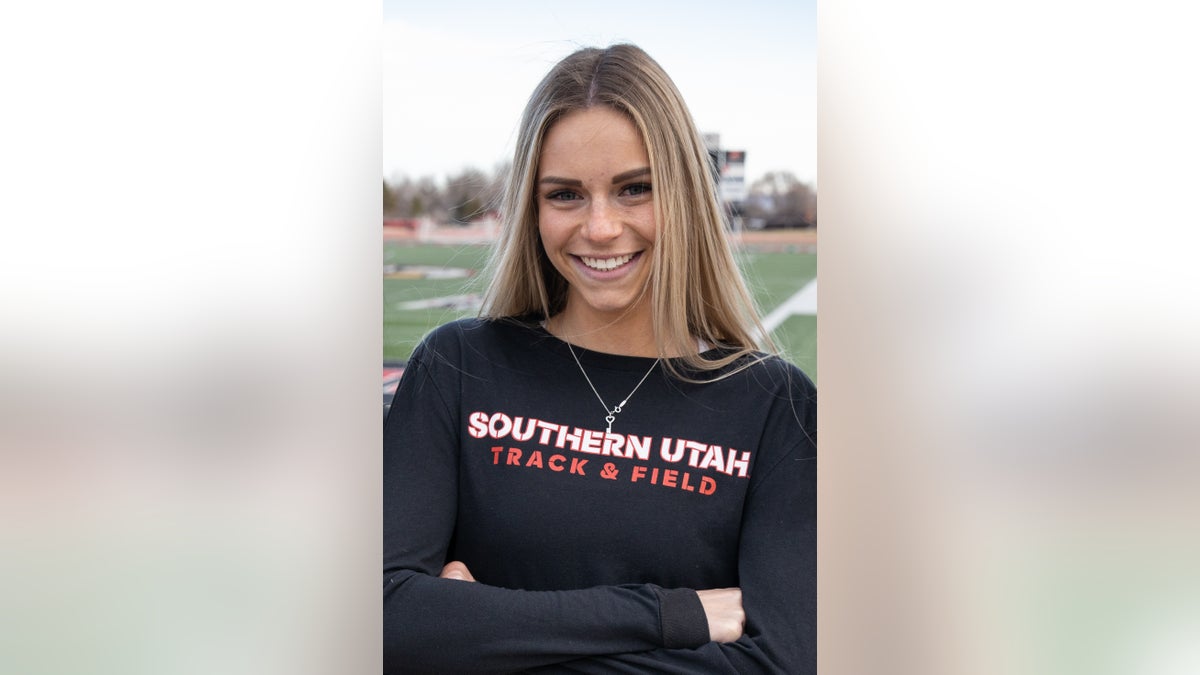Female swimmer who tied Lia Thomas speaks out
University of Kentucky swimmer Riley Gaines joins 'Tucker Carlson Tonight' to discuss NCAA handling of meet.
Athletics is about far more than sports. For those who participate, it can represent a way of life. The lessons we learn on the field, on the track, on the court, or in the pool carry over into every other part of our lives.
My years of running track and field have pushed me to do things I never thought I could. They’ve shown me the importance of teamwork and of training and competing with people you can trust and respect. They’ve helped me to understand that sacrifice and grueling hard work are worth every hard moment. And, for much of my career, athletics taught me that everyone deserves the chance for fair competition.
But athletics aren’t teaching women and girls that anymore.
WHO WILL STAND UP FOR ME AND OTHER WOMEN BEING BEATEN BY BIOLOGICAL MALES LIKE LIA THOMAS?
Instead, the NCAA has threatened to pull championship competitions from states that reserve women’s sports for females. While NCAA officials have made it clear that they want athletes to participate in events based on their gender identity—not their biological sex—they’re also leaving final decisions and enforcement up to the administrators of individual sports. This allows them to assert their will without taking responsibility for the damage they’re ensuring to women’s sports.

Former Southern Utah track & field athlete Linnea Saltz. (ADF)
Meanwhile, more and more female athletes find themselves competing—not to mention showering and sharing a locker room—with male athletes.
Males have inherent physical advantages over females. They have greater muscle mass and bigger lungs. They are, in general, faster, stronger, bigger, and physically tougher than females. For all of these reasons, and many more, it is simply not fair to compel women to compete against male athletes.
WOMEN'S ADVOCACY GROUPS SILENT ON TRANSGENDER SWIMMER LIA THOMAS' DOMINATION AT NCAA CHAMPIONSHIPS
I found out just how unfair it is when I competed in the NCAA, running track and field at Southern Utah University. Just before my senior year, I learned that an athlete who had previously competed on the men’s team at the University of Montana would now be competing against me—identifying as a female.
In the previous year, I had accomplished more than I could have imagined. I’d won the Outdoor Big Sky Conference Championship in the 800-meter, qualified for the West Regional NCAA Outdoors competition, and was working towards an All-American track title. But now, I was going to be competing against an athlete with immense biological, inherent advantages.
Everything I had accomplished leading up to this point was possible because of my dedication, work ethic, will power, and endless hours of practice and competition. Nothing I had achieved was handed to me, yet my sacrifices seemed to no longer be valued.
LIA THOMAS TIES FOR FIFTH IN 200 FREESTYLE, IS IGNORED BY COMPETITORS AS SHE EXITS POOL
As a male athlete, he had posted good times for a male runner—3:50 for the 1,500-meter. But that’s the same as the world record time for female athletes competing in that event. In other words, college female athletes were being forced to compete against a male who had already beaten the record of all female runners.
Suddenly, the goals I had been working toward for years were knocked out of reach.
The same thing happened to women in Connecticut, which is a state that allows males to compete in women’s events. There, high school athletes Selina Soule, Alanna Smith, and Chelsea Mitchell lost irreplaceable opportunities.
Selina missed out on going to the New England Regionals Championship, where she could have raced in front of college recruiters and competed for scholarships, by just two spots—spots taken by biological males.

University of Pennsylvania transgender athlete Lia Thomas swims in a preliminary heat for the 500 meter freestyle at the NCAA Swimming and Diving Championships Thursday, March 17, 2022, at Georgia Tech in Atlanta. ____ Transgender woman Lia Thomas (L) of the University of Pennsylvania stands on the podium after winning the 500-yard freestyle as other medalists (L-R) Emma Weyant, Erica Sullivan and Brooke Forde pose for a photo at the NCAA Division I Women's Swimming & Diving Championshipon March 17, 2022 in Atlanta, Georgia. (AP Photo/John Bazemore | Justin Casterline/Getty Images)
Alanna was bumped from second place in the Regionals Championship to third place, by a male. And four times, Chelsea lost the State Champion title to a male. This led them to file suit through their attorneys with Alliance Defending Freedom—a lawsuit that continues today.
CLICK HERE TO GET THE OPINION NEWSLETTER
When I saw that this same thing was about to happen in my conference, I spoke up. But the NCAA did not change its policy.
As it turned out, the male athlete chose not to run in the 800-meter race at the 2020 Big Sky Indoor Conference Championship. That gave me a window to win. But that same athlete took first place in the indoor mile, knocking a female runner off the podium.
Later, at that same meet, my team was racing in the Distance Medley relay against the University of Montana, anchored by their male runner.

Linnea Saltz
After I finished my leg of the race, I watched my teammates pour their hearts out on the track just as I did before them only to hear the Montana coach say something to that male athlete that I’d never heard in competition before.
He was telling the runner to slow down.
CLICK HERE TO GET THE FOX NEWS APP
That’s the opposite of competition. But it’s the lesson the NCAA is teaching girls and women right now: that no matter how hard they try, they don’t deserve to compete on a level playing field.
That is why I, and numerous female athletes like me, support the many state governments that have passed laws protecting women’s sports. These states are doing what the NCAA and International Olympic Committee are refusing to do: ensure fair play and protect women’s sports.











































